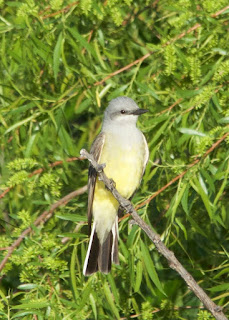Great-tailed Grackle
Western Kingbird
Yellow Warbler (Male)
Clay-colored Sparrow
Double-crested Cormorant
Red-winged Blackbird (Female)
Fledgling Eastern Phoebe
Carolina Chickadee
05-03-16
0655-1030 hrs./46-67 degrees F/partly cloudy/15 mph winds
Yesterday was a most productive day, as there are babies both on Boomer Lake and Boomer Creek.
With the passage of time and good seasonal tailwinds, we have been very fortunate this year regarding what has been coming our way. Every day that I go out for photographic opportunities, I thank the birds for giving me what they do, as being humble tends to keep humanity in check for the beautiful scenery in both flora and fauna. As long as we help to protect it, we will have moments like these to enjoy, and I also thank you for allowing me to bring nature to you through my eyes.
The winds brought us wonderful things yesterday, like the Western Kingbird and Clay-colored Sparrow. The Western Kingbird will stay here for the summer and bring us their young. The Clay-colored Sparrow is a transient bird and breeds in the north central states and Canada.
The real surprise was out on Boomer Creek, where I found an entire family of Eastern Phoebes. Both adults were actively feeding their three young, who had recently fledged. Among this wonderful crop of nature's bounty were more Carolina Chickadees that I could count, also teaching their young ones the ways of their world and intruding them to their own little world.
This is the reason that we must make their world safe for them to continue their circle of life, and we must do our part to slow global warming as much as we can, and keep plastic and other trash away from their habitat.








No comments:
Post a Comment